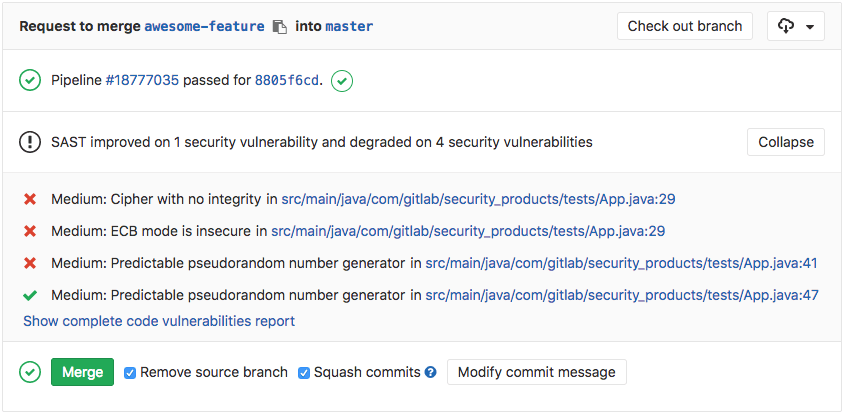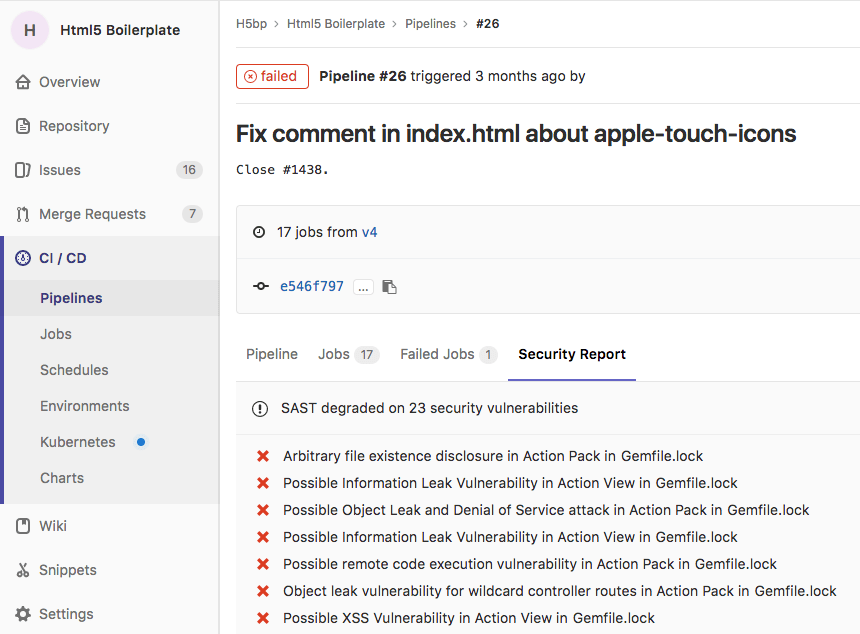Static Application Security Testing (SAST) (ULTIMATE)
Introduced in GitLab Ultimate 10.3.
NOTE: 4 of the top 6 attacks were application based. Download our whitepaper, "A Seismic Shift in Application Security" to learn how to protect your organization.
Overview
If you are using GitLab CI/CD, you can analyze your source code for known vulnerabilities using Static Application Security Testing (SAST).
You can take advantage of SAST by either including the CI job in
your existing .gitlab-ci.yml file or by implicitly using
Auto SAST
that is provided by Auto DevOps.
GitLab checks the SAST report, compares the found vulnerabilities between the source and target branches, and shows the information right on the merge request.
The results are sorted by the priority of the vulnerability:
- Critical
- High
- Medium
- Low
- Unknown
- Everything else
Use cases
- Your code has a potentially dangerous attribute in a class, or unsafe code that can lead to unintended code execution.
- Your application is vulnerable to cross-site scripting (XSS) attacks that can be leveraged to unauthorized access to session data.
Requirements
To run a SAST job, you need GitLab Runner with the
docker or
kubernetes
executor running in privileged mode. If you're using the shared Runners on GitLab.com,
this is enabled by default.
Supported languages and frameworks
The following table shows which languages, package managers and frameworks are supported and which tools are used.
| Language (package managers) / framework | Scan tool | Introduced in GitLab Version |
|---|---|---|
| .NET | Security Code Scan | 11.0 |
| Any | Gitleaks and TruffleHog | 11.9 |
| Apex (Salesforce) | pmd | 12.1 |
| C/C++ | Flawfinder | 10.7 |
| Elixir (Phoenix) | Sobelow | 11.10 |
| Go | Gosec | 10.7 |
| Groovy (Ant, Gradle, Maven and SBT) | SpotBugs with the find-sec-bugs plugin | 11.3 (Gradle) & 11.9 (Ant, Maven, SBT) |
| Java (Ant, Gradle, Maven and SBT) | SpotBugs with the find-sec-bugs plugin | 10.6 (Maven), 10.8 (Gradle) & 11.9 (Ant, SBT) |
| Javascript | ESLint security plugin | 11.8 |
| Node.js | NodeJsScan | 11.1 |
| PHP | phpcs-security-audit | 10.8 |
| Python (pip) | bandit | 10.3 |
| Ruby on Rails | brakeman | 10.3 |
| Scala (Ant, Gradle, Maven and SBT) | SpotBugs with the find-sec-bugs plugin | 11.0 (SBT) & 11.9 (Ant, Gradle, Maven) |
| Typescript | TSLint config security | 11.9 |
NOTE: Note: The Java analyzers can also be used for variants like the Gradle wrapper, Grails and the Maven wrapper.
Configuration
For GitLab 11.9 and later, to enable SAST, you must
include the
SAST.gitlab-ci.yml template
that's provided as a part of your GitLab installation.
For GitLab versions earlier than 11.9, you can copy and use the job as defined
that template.
Add the following to your .gitlab-ci.yml file:
include:
template: SAST.gitlab-ci.ymlThe included template will create a sast job in your CI/CD pipeline and scan
your project's source code for possible vulnerabilities.
The results will be saved as a SAST report artifact that you can later download and analyze. Due to implementation limitations, we always take the latest SAST artifact available. Behind the scenes, the GitLab SAST Docker image is used to detect the languages/frameworks and in turn runs the matching scan tools.
Customizing the SAST settings
The SAST settings can be changed through environment variables by using the
variables parameter in .gitlab-ci.yml.
These variables are documented in the
SAST tool documentation.
In the following example, we include the SAST template and at the same time we
set the SAST_GOSEC_LEVEL variable to 2:
include:
template: SAST.gitlab-ci.yml
variables:
SAST_GOSEC_LEVEL: 2Because the template is evaluated before the pipeline configuration, the last mention of the variable will take precedence.
Overriding the SAST template
If you want to override the job definition (for example, change properties like
variables or dependencies), you need to declare a sast job after the
template inclusion and specify any additional keys under it. For example:
include:
template: SAST.gitlab-ci.yml
sast:
variables:
CI_DEBUG_TRACE: "true"Available variables
SAST can be configured using environment variables.
Docker images
The following are Docker image-related variables.
| Environment variable | Description |
|---|---|
SAST_ANALYZER_IMAGES |
Comma separated list of custom images. Default images are still enabled. Read more about customizing analyzers. |
SAST_ANALYZER_IMAGE_PREFIX |
Override the name of the Docker registry providing the default images (proxy). Read more about customizing analyzers. |
SAST_ANALYZER_IMAGE_TAG |
Override the Docker tag of the default images. Read more about customizing analyzers. |
SAST_DEFAULT_ANALYZERS |
Override the names of default images. Read more about customizing analyzers. |
SAST_PULL_ANALYZER_IMAGES |
Pull the images from the Docker registry (set to 0 to disable). Read more about customizing analyzers. |
Vulnerability filters
Some analyzers make it possible to filter out vulnerabilities under a given threshold.
| SAST_BANDIT_EXCLUDED_PATHS | - | comma-separated list of paths to exclude from scan. Uses Python's fnmatch syntax |
| SAST_BRAKEMAN_LEVEL | 1 | Ignore Brakeman vulnerabilities under given confidence level. Integer, 1=Low 3=High. |
| SAST_FLAWFINDER_LEVEL | 1 | Ignore Flawfinder vulnerabilities under given risk level. Integer, 0=No risk, 5=High risk. |
| SAST_GITLEAKS_ENTROPY_LEVEL | 8.0 | Minimum entropy for secret detection. Float, 0.0 = low, 8.0 = high. |
| SAST_GOSEC_LEVEL | 0 | Ignore gosec vulnerabilities under given confidence level. Integer, 0=Undefined, 1=Low, 2=Medium, 3=High. |
| SAST_EXCLUDED_PATHS | - | Exclude vulnerabilities from output based on the paths. This is a comma-separated list of patterns. Patterns can be globs, file or folder paths. Parent directories will also match patterns. |
Timeouts
The following variables configure timeouts.
| SAST_DOCKER_CLIENT_NEGOTIATION_TIMEOUT | 2m | Time limit for Docker client negotiation. Timeouts are parsed using Go's ParseDuration. Valid time units are "ns", "us" (or "µs"), "ms", "s", "m", "h". For example, "300ms", "1.5h" or "2h45m". |
| SAST_PULL_ANALYZER_IMAGE_TIMEOUT | 5m | Time limit when pulling the image of an analyzer. Timeouts are parsed using Go's ParseDuration. Valid time units are "ns", "us" (or "µs"), "ms", "s", "m", "h". For example, "300ms", "1.5h" or "2h45m". |
| SAST_RUN_ANALYZER_TIMEOUT | 20m | Time limit when running an analyzer. Timeouts are parsed using Go's ParseDuration. Valid time units are "ns", "us" (or "µs"), "ms", "s", "m", "h". For example, "300ms", "1.5h" or "2h45m".|
Analyzer settings
Some analyzers can be customized with environment variables.
| Environment variable | Analyzer | Description |
|---|---|---|
ANT_HOME |
spotbugs | The ANT_HOME environment variable. |
ANT_PATH |
spotbugs | Path to the ant executable. |
GRADLE_PATH |
spotbugs | Path to the gradle executable. |
JAVA_OPTS |
spotbugs | Additional arguments for the java executable. |
JAVA_PATH |
spotbugs | Path to the java executable. |
MAVEN_CLI_OPTS |
spotbugs | Additional arguments for the mvn or mvnw executable. |
MAVEN_PATH |
spotbugs | Path to the mvn executable. |
MAVEN_REPO_PATH |
spotbugs | Path to the Maven local repository (shortcut for the maven.repo.local property). |
SBT_PATH |
spotbugs | Path to the sbt executable. |
FAIL_NEVER |
spotbugs | Set to 1 to ignore compilation failure. |
Reports JSON format
CAUTION: Caution: The JSON report artifacts are not a public API of SAST and their format may change in the future.
The SAST tool emits a JSON report report file. Here is an example of the report structure with all important parts of it highlighted:
{
"version": "2.0",
"vulnerabilities": [
{
"category": "sast",
"name": "Predictable pseudorandom number generator",
"message": "Predictable pseudorandom number generator",
"description": "The use of java.util.Random is predictable",
"cve": "818bf5dacb291e15d9e6dc3c5ac32178:PREDICTABLE_RANDOM",
"severity": "Medium",
"confidence": "Medium",
"scanner": {
"id": "find_sec_bugs",
"name": "Find Security Bugs"
},
"location": {
"file": "groovy/src/main/groovy/com/gitlab/security_products/tests/App.groovy",
"start_line": 47,
"end_line": 47,
"class": "com.gitlab.security_products.tests.App",
"method": "generateSecretToken2",
"dependency": {
"package": {}
}
},
"identifiers": [
{
"type": "find_sec_bugs_type",
"name": "Find Security Bugs-PREDICTABLE_RANDOM",
"value": "PREDICTABLE_RANDOM",
"url": "https://find-sec-bugs.github.io/bugs.htm#PREDICTABLE_RANDOM"
},
{
"type": "cwe",
"name": "CWE-330",
"value": "330",
"url": "https://cwe.mitre.org/data/definitions/330.html"
}
]
},
{
"category": "sast",
"message": "Probable insecure usage of temp file/directory.",
"cve": "python/hardcoded/hardcoded-tmp.py:4ad6d4c40a8c263fc265f3384724014e0a4f8dd6200af83e51ff120420038031:B108",
"severity": "Medium",
"confidence": "Medium",
"scanner": {
"id": "bandit",
"name": "Bandit"
},
"location": {
"file": "python/hardcoded/hardcoded-tmp.py",
"start_line": 10,
"end_line": 10,
"dependency": {
"package": {}
}
},
"identifiers": [
{
"type": "bandit_test_id",
"name": "Bandit Test ID B108",
"value": "B108",
"url": "https://docs.openstack.org/bandit/latest/plugins/b108_hardcoded_tmp_directory.html"
}
]
},
],
"remediations": []
}Here is the description of the report file structure nodes and their meaning. All fields are mandatory to be present in the report JSON unless stated otherwise. Presence of optional fields depends on the underlying analyzers being used.
| Report JSON node | Function |
|---|---|
version |
Report syntax version used to generate this JSON. |
vulnerabilities |
Array of vulnerability objects. |
vulnerabilities[].category |
Where this vulnerability belongs (SAST, Dependency Scanning etc.). For SAST, it will always be sast. |
vulnerabilities[].name |
Name of the vulnerability, this must not include the occurrence's specific information. Optional. |
vulnerabilities[].message |
A short text that describes the vulnerability, it may include the occurrence's specific information. Optional. |
vulnerabilities[].description |
A long text that describes the vulnerability. Optional. |
vulnerabilities[].cve |
A fingerprint string value that represents a concrete occurrence of the vulnerability. Is used to determine whether two vulnerability occurrences are same or different. May not be 100% accurate. This is NOT a CVE. |
vulnerabilities[].severity |
How much the vulnerability impacts the software. Possible values: Undefined (an analyzer has not provided this info), Info, Unknown, Low, Medium, High, Critical. |
vulnerabilities[].confidence |
How reliable the vulnerability's assessment is. Possible values: Undefined (an analyzer has not provided this info), Ignore, Unknown, Experimental, Low, Medium, High, Confirmed. |
vulnerabilities[].solution |
Explanation of how to fix the vulnerability. Optional. |
vulnerabilities[].scanner |
A node that describes the analyzer used to find this vulnerability. |
vulnerabilities[].scanner.id |
Id of the scanner as a snake_case string. |
vulnerabilities[].scanner.name |
Name of the scanner, for display purposes. |
vulnerabilities[].location |
A node that tells where the vulnerability is located. |
vulnerabilities[].location.file |
Path to the file where the vulnerability is located. Optional. |
vulnerabilities[].location.start_line |
The first line of the code affected by the vulnerability. Optional. |
vulnerabilities[].location.end_line |
The last line of the code affected by the vulnerability. Optional. |
vulnerabilities[].location.class |
If specified, provides the name of the class where the vulnerability is located. Optional. |
vulnerabilities[].location.method |
If specified, provides the name of the method where the vulnerability is located. Optional. |
vulnerabilities[].identifiers |
An ordered array of references that identify a vulnerability on internal or external DBs. |
vulnerabilities[].identifiers[].type |
Type of the identifier. Possible values: common identifier types (among cve, cwe, osvdb, and usn) or analyzer-dependent ones (e.g., bandit_test_id for Bandit analyzer). |
vulnerabilities[].identifiers[].name |
Name of the identifier for display purposes. |
vulnerabilities[].identifiers[].value |
Value of the identifier for matching purposes. |
vulnerabilities[].identifiers[].url |
URL to identifier's documentation. Optional. |
Secret detection
GitLab is also able to detect secrets and credentials that have been unintentionally pushed to the repository. For example, an API key that allows write access to third-party deployment environments.
This check is performed by a specific analyzer during the sast job. It runs regardless of the programming
language of your app, and you don't need to change anything to your
CI/CD configuration file to turn it on. Results are available in the SAST report.
GitLab currently includes Gitleaks and TruffleHog checks.
Security report under pipelines
Introduced in GitLab Ultimate 10.6.
Visit any pipeline page which has a sast job and you will be able to see
the security report tab with the listed vulnerabilities (if any).
Security Dashboard
The Security Dashboard is a good place to get an overview of all the security vulnerabilities in your groups and projects. Read more about the Security Dashboard.
Interacting with the vulnerabilities
Once a vulnerability is found, you can interact with it. Read more on how to interact with the vulnerabilities.
Vulnerabilities database update
For more information about the vulnerabilities database update, check the maintenance table.


